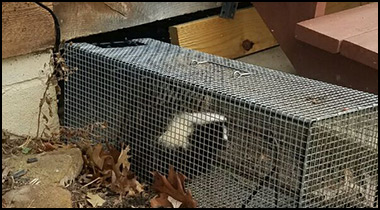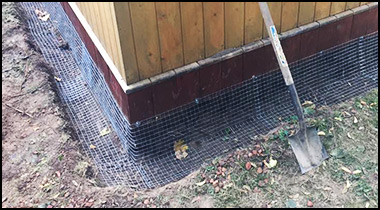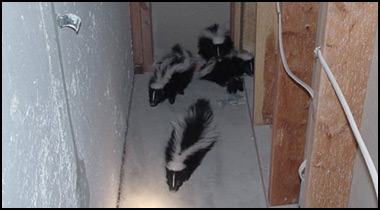Pittsburgh Skunk Removal Resources
Skunk Rehabber - Humane Animal Rescue Wildlife Center: (412) 345-7300 ext. 500
Free Allegheny County Animal Services: (412) 255-2036
Humane Wildlife Trappers of Pittsburgh: 412-228-4945
If you need skunk control in Pittsburgh, you have a few options. First, you can attempt to solve the skunk problem yourself by reading our do-it-yourself guide. If you need outside help, you can also call Allegheny County Animal Services to see if they have any free resources or help for you - however, they primarily deal with dog and cat concerns. You can also call a local Pittsburgh wildlife rehabber, as they are typically a great resource for advice that is in the best welfare of the animal. If as a last resort you must hire a professional company, we recommend Humane Wildlife Trappers of Pittsburgh at 412-228-4945. To learn more about them or check their skunk removal prices, visit pittsburghpestanimal.com.

Pittsburgh Skunk Trapping and Removal

Preventative Repairs & Exclusion

Pittsburgh Skunk Removal From Structures
In many cases, preventative measures can solve your Pittsburgh skunk problem - keep garbage secured, pet food indoors, and most of all when it comes to skunks, secure the perimeter of your shed, porch, deck, or house with a barrier - lattice or steel mesh is good, and it keeps Pennsylvania skunks from going under the structure. If trapping and removal of the skunk is the only option you have, please do so with the help of a local agency or professional company who knows how to do it humanely and legally. Browse the resources of this site for more educational information.
Frequently Asked Questions:
Prevention: How to Keep Skunks Away
What to do with a skunk after I catch it?
Is it legal for me to trap a skunk?
How to remove skunk odor
Is a skunk active during the daytime rabid?
What does skunk feces look like?
Pittsburgh Skunk Control Information: What is a skunk's natural diet, and how does it get its food?
Skunks are opportunistic eaters, enjoying both plants and animal proteins. They will most often eat whatever is available and only forage about a two mile radius. They enjoy fruits, vegetables, plants, nuts, and fungi like mushrooms. They will also eat insects and their larvae, rodents, snakes, worms, amphibians, some birds, and eggs. They retrieve their food by using their strong front claws to dig and scratch their food from the ground, tree stumps and other places. They adjust eating habits according to the time of year. They also modify their diets according to what is available in the area.
Another favorite food of Skunks is honeybees. Because of their thick hair they are able to enjoy a meal of bees without getting stung. To harvest the bees, a skunk will scratch out the front of a hive, swat the bees that fly out, and quickly eat them. This method of feeding is so exclusive to the skunk that they teach it to their offspring. Skunks are crepuscular by nature, meaning that they will forage and eat during dusk and dawn. If it is absolutely necessary, a skunk will venture out in the daytime to search for food. All four varieties of skunks eat most of the same things. Their particular diet is dependent on area they live and season, not type of skunk.
Roughly 70percent of their entire diet consists of insects. Besides honey bees, they love beetles, grubs, and worms. they also often ravage ant hills or termite mounds for a tasty snack as well. when Skunks take up residence near human neighborhoods, they choose to wander into yards with trash bins, open feed containers, or into your garages and areas where pet food might be left out. Skunks are often found digging holes in yards and gardens looking for grubs, worms, and other insects. If they are starving, they may be found eating bird or rodent carcasses
Remember, for free services you can try (412) 345-7300 ext. 500 or (412) 255-2036, but if you need to pay for professional help, check the prices at the pittsburghpestanimal.com website. Or follow our do-it-yourself guide!

